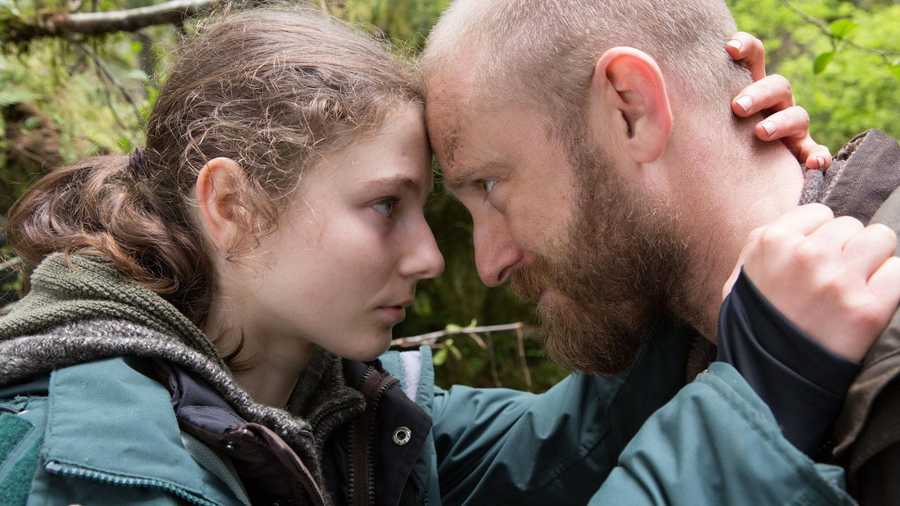
“The last time Debra Granik had a film at Sundance, it was the masterful Ozark coming-of-age thriller Winter’s Bone, which won Oscar nominations and introduced the world to a certain young actress named Jennifer Lawrence.” Bilge Ebiri in the Village Voice: “Granik has returned to the festival this year with Leave No Trace, another movie focusing on the experiences of a young woman living on the margins of society—this time, rather than a seventeen-year-old trying to hold her impoverished family together, it’s a thirteen-year-old trying to survive in the woods with her father. It might not have the genre elements that helped make Winter’s Bone something of a breakout, but Leave No Trace rivets and terrifies in its own way.”
“A man as humble and inscrutably compassionate as the movie around him, Will (Ben Foster) doesn’t like to say very much or make himself vulnerable, not even to the tween daughter he’s raising by himself in the verdant sogginess of Portland’s Forest Park.” IndieWire’s David Ehrlich: “Tom (New Zealand actress Thomasin Harcourt McKenzie) is probably aware that her dad served overseas, but she may not know where, or why his experience inspired him to raise her off the grid. . . . Adapted from the 2009 Peter Rock novel My Abandonment and refitted with a less violent title that suits this version’s gentle soul, Leave No Trace sprouts into a modest but extraordinarily graceful film about what people need from each other, and the limits of what they can give of themselves.”
“Leave No Trace is a joyous introduction to Thomasine Harcourt McKenzie,” declares David Edelstein at Vulture. “Her Thom has different rhythms than other people—more deliberate—and a grown-up face with watchful gray eyes that you rarely catch blinking. She speaks carefully, as if words are too dear to waste on inessentials. The heart of Leave No Trace is the rapport between the father and daughter, and McKenzie and Foster are keyed to each other’s movements, perhaps even each other’s thoughts.”
For Mike D’Angelo, though, “the father-daughter bond here, upon which Leave No Trace almost wholly depends, never quite took hold, which leaves me admiring a film that I very much want to love. Certainly this confirms Granik as a major talent, committed to exploring the thorny relationship between character and environment.”
“Granik has carved out a niche as one of American cinema’s foremost chroniclers of the white poor and working class,” writes Jon Frosch in the Hollywood Reporter. “Since the rise of Trump, these citizens (and oh-so-hot election commodities) have been on the receiving end of renewed fascination in newspaper pages—and, less fetishistically, though unmistakably, in movies like Logan Lucky, The Florida Project, Three Billboards Outside Ebbing, Missouri, and I, Tonya. But with Granik’s films, unlike some of those aforementioned, you don’t feel the distance between director and milieu. She doesn’t approach her marginalized characters as objects of curiosity or comedy, derision or pity; she comes at them straight-on, with clear-eyed, unsentimental compassion.”
“Granik’s partner in this endeavor is Foster, who gives Will a silent volatility that always hints at a secret pain running so deep within this gentle, melancholy character that we fear what would happen if he ever erupted,” writes Screen’s Tim Grierson. “Instead, Will is nothing but loving to Tom, who seems to gravitate to the peculiar circumstance in which she’s been raised. Unfortunately for Will, his insistence that she be an independent free-thinker may have consequences: Over the course of Leave No Trace, McKenzie charts Tom’s slow realization that the life he’s chosen for them might not be the one she wants for herself anymore.”
Variety’s Peter Debruge finds that “Granik’s approach is reminiscent of the sensitive, stripped-down style of Kelly Reichardt’s work (Wendy and Lucy, Certain Women), by reteaming with Scottish cinematographer Michael McDonough (who shot not only Winter’s Bone, but also Terence Davies’s radiant Sunset Song and the gritty prison drama Starred Up), she creates a richer visual environment in which to dwell.”
“Aside from her documentary Stray Dog in 2014, the fifty—fouryear-old director has been mostly absent from the screen,” notes Kyle Buchanan at Vulture. “‘Every filmmaker has this short book of films that don’t get made, for a whole host of reasons,’ said Granik, who admitted that sometimes, that inability to get a project off the ground could wear on her. . . . ‘It never felt like an unbusy time. The years were filled with labor as a cultural worker, but yes, the product was scant.’”
Deadline’s Anthony D’Alessandro reports that Sony Pictures Worldwide Acquisitions has picked up international rights. “The deal excludes North America.”
For news and items of interest throughout the day, every day, follow @CriterionDaily.
from The Criterion Current http://ift.tt/2n0HQk6
Nessun commento:
Posta un commento